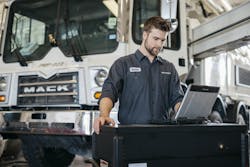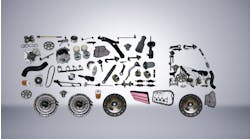Volvo and Mack trucks dealers are creating new procedures to help ensure the safety of employees and customers requiring service and support during the COVID-19 pandemic.
Social distancing and other public health considerations are now part of Certified Uptime, a process created by Volvo Trucks North America (VTNA) and Mack Trucks — both are Volvo Group companies — built around best practices for their truck dealers to increase quality, optimize service and repair efficiencies while enhancing their customer experience.
Dealers of both brands are using the ASIST communications platform that automates documentation for service events, automatically gathers all essential vehicle information, and minimizes in-person contact with customers and fellow dealer technicians.
“We’re seeing our Certified Uptime dealers across the U.S. and Canada going the extra mile to maintain our standards of excellence while ensuring human safety throughout the service process,” said Conal Deedy, VTNA’s director of customer productivity solutions. “The dedication from our dealers, together with our collaborations with key partners to maximize efficiencies and streamline the service experience from point to point, is a critical advantage during the ongoing health crisis.”
Shop efficiency at 156 Mack Certified Uptime Dealers has increased by 24%, according to Mack, which noted that check-in time for customers was reduced by 40 minutes and diagnostic times decreased by 70%.
“It’s imperative that dealer employees and customers maintain their health and safety at all times, but especially during the current situation,” said David Pardue, Mack vice president of connected vehicle and uptime services. “Many of our dealers, and especially Mack Certified Uptime Dealers, have taken extra precautions to develop best practices and new ways of working to help reduce exposure risks.”
Among those dealers seeing social distancing success are TranSource in Colfax, N.C., and Vision Truck Group (VTG) in Cambridge, Ontario, which have met Mack and VTNA’s requirements to improve customer service. Both OEMs said repairs are quicker at these dealers because of standardized workflows and redesigned service bays reserved specifically for trucks requiring less than four hours of work for service and repair.
Along with social distancing, workplace and vehicle disinfection, staggered work shifts, adjusted break and lunchtimes, usages of mask, gloves and disinfectants and hand sanitizer, VTG moved to a paperless operation, minimizing face-to-face interaction while still enabling efficiency by utilizing Mack ASIST, Mack’s web-based service management system.
“The COVID-19 pandemic presented unprecedented challenges of social distancing in our industry,” said John Slotegraaf, the VTG president. “Vision already had some processes in place, including creating a paperless operation in 2019, offering a strong response to minimize exposure risk.”
No paper is passed throughout the site. Rather, teams at VTG communicate via ASIST, allowing technicians to receive and view work assignments on their iPads, while also offering fleet managers complete visibility into the work being completed. VTG sites also feature enhanced automation, including motion-activated lighting, faucets, toilets, hand dryers, water fountains and doors, enabling employees and customers to avoid contact with typically highly touched areas.
TranSource also has made changes as a result of the COVID-19 situation, offering pickup and delivery services to assist customers who are working with reduced staff.
“Many of our customers may need service but do not have the personnel available to bring the truck into our dealership,” said Jason Lucero, service director at TranSouce. “Recognizing this, we are offering them an option to have a CDL driver transport their truck should they need it.”
TranSource is also increasing training for its staff at this time and making sure any customers with vehicles affected by open campaigns or recalls are contacted to make sure their vehicle is addressed.
Mack and VTNA dealer Affinity Truck Center (ATC), which has two Certified Uptime locations in California’s Central Valley, created a process for quick, accurate service check-ins. As trucks enter, they trigger a bell in the service office. A technician thoroughly disinfects each truck before it is driven through the gate. Each new write-up is handled through a secure, tented entryway equipped with a sensor that alerts service staff when a customer enters. Specially installed plexiglass barriers separate the customer and service advisor during check-in.
“Now that the weather is heating up, we are actively looking into additional ways to keep our customers safe and enable them to practice social distancing in a comfortable, indoor environment,” said ATC service manager Chris Paris. “Along with custom plexiglass shields and floor markers in both the parts and sales sides of all of our facilities, we are in the process of opening a larger customer waiting room with dedicated restrooms in a building next to our service location in Fresno, and have remodeled a storage room off the shop floor for an additional customer lounge in our Bakersfield location.”




